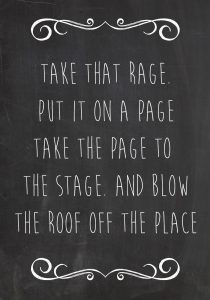Rejection and how to handle it with grace
Here is the next article as part of the #Authortoolboxbloghop organised by author Raimey Gallant.
The #AuthorToolboxBlogHop is a monthly event on the topic of resources and learning for authors. Feel free to hop around to the various blogs and see what you learn! The rules and sign-up form are below the list of hop participants. All authors at all stages of their careers are welcome to join.
A little life story and how my unlucky high school love life helped my writing career
This might seem only marginally related to writing, but there were times when only these thoughts and memories made me push on and prevented me from throwing my whole writing career into the dustbin. Okay, actually I would probably never throw writing in the garbage, but still.
From the moment when hormones hit, so about the time when I was twelve, I was in love. But like constantly. Nonstop. And it was always unrequited. The scenario was usually this: I was pining for a while, then I got bored of it and sent one of my friends, acquaintances, classmates etc. to find out what the object of my adoration thought of me. The answer was either “I have no idea who she is,” if the person was a gracious white liar or, in most of the cases, “heck,no.” I spent a few hours crying under the dining room table listening to Stop Crying your heart out
mourning my girlhood, my life, my future, like Antigone when she’s carried away to be executed. I honestly believed that all was lost, I could close shop, my heart would wither for good and this is THE END in all capitals. I might have been a bit over dramatic, but I was already a writer and a teenager on top of that.
A few weeks or, in extreme cases, months later I would discover a promising young man on the school corridor and it would all start again. Dreaming, rejection, failure, rebound. (It happened more than ten times and I still didn’t become a homicidal maniac because nobody wanted to have sex with love me. N’est-ce pas, certain radical men’s groups?)
What did I do with all the frustration and sadness? I wrote. Mostly somewhat horrible emo poems and mostly to the bottom of my drawer, but it helped me survive and go on and it also taught me two rules of healthy rejection rebound:
- Transform your sadness into creativity.
- Bare rejection with grace. Don’t argue and most of don’t insult the person who rejected you.
At least not to their face, you can write a poem or a letter to them and keep it stored away on your computer or crumple it up and throw it on the fire, but never let your raw rage show. It’s just not a pretty sight.
Listen to The Script when they sing:
That’s what I do. That’s what I’ve always done.
To cut a long story short, after I went to university and I wasn’t only surrounded by twats, I found guys who appreciated me and I’m now married.
Would I be the same person if I didn’t go through this romantic purgatory in my adolescence? I don’t think so, especially that this purging fire was what fuelled me to seriously turn to writing. The moral of the story is that you should never give up.
As I’ve mentioned before, my younger years were spent not only with romantic reveries, but also with writing. I was full of dreams and good will and I was very lucky because my literature teacher believed in me and supported me. She kindled a fire in my soul which could not be put out by rejections. She believed in me in times when I didn’t, so it made me push on.
You have to know that my mother tongue is Hungarian and that was the primary language of my writing as well. Problem is, the Hungarian market is awfully tiny (a little more than ten million people) there isn’t a lot of money in it and it’s pretty backward in certain things. It’s often that people don’t even acknowledge your submissions or answer in a very rude or hurtful way. (A lady who didn’t even know me said: Oh yes, you indeed live in the little pink world inside your head only noticing the things you want to notice. You react very badly to criticism, so you should learn to be humble because it’s essential in this carrier.) All this allowed me at least to become more resilient.
It was so refreshing when I ventured out to the English speaking literary world in 2013 and was welcomed not only by a plethora of possibilites, but also by people who communicate efficiently and respectfully. Even if it’s often a form rejection, they at least acknowledged me.
In the beginning, it was mostly rejections. Heck, it’s still mostly rejections, you should see my Submittable page… but I have more and more stories accepted and many of the rejections have become more detailed, more personal, encouraging me to submit something else later. These rejections are sometimes more valuable than a form acceptance.
I have an Excel table with my submissions. When I’m rejected I note it in my table and do my best to submit the piece to another market right away. If I realise that it needs to be edited, I reread it and polish it up a bit, then I send it on my way. If I realise that it was rejected because it’s a truly poop story, I write a better one.
So let us summarize my three golden rules for handling rejections:
- Don’t give up. Reread it, ask your beta readers, rewrite it, resend it, write a new one. DO NOT GIVE UP.
- Always be polite. Always! Even if they happen to be rude. That’s their problem, not yours. Don’t try to explain the genius of your submission and do not tell them to fuck off. If we are at it, always read the submission guidelines carefully and send only what they ask for.
- You don’t always need to stay optimistic, sometimes it’s better to give int o sadness, to despair, to let our hair down. Let these „bad” feelings wash over you, because trying to press them will only swell them up and make them hit harder in the future. If we have learnt anything from “Inside out” it’s that it is okay, what is more, important to be sad sometimes.
My previous post in this blog hop:
Find my August #Authortoolboxblog hop post here.
Find my September #Authortoolboxbloghop post here.
Find my October #Authortoolboxbloghop post here.
Find my January #Authortoolboxbloghop post here.
Find my March #Authortoolboxbloghop post here.


Ah, the dramatic ways of teenagers 🙂 But at least it taught us to be strong. Thanks for sharing.
Ronel visiting on Author Toolbox blog hop day: Taking Impostor Syndrome to Its Limits
Nice tips for handling rejection, particularly to write it out. Those sad emotions are always easier to deal with when they’re on paper 🙂
OH gosh. I think we were all pretty dramatic as teenagers. Thankfully, it passes for most of us.
I always say to kill rejection (or a nasty critique) with kindness. If a response is needed, like for a critique, just thank him/her for their suggestions and leave it at that. And then maybe punch a couch cushion a few times to get out an pent up aggression. haha
Enjoyed reading. Great tips.
Rejection makes success so much sweeter. We know we’ve earned it. 🙂
Anna from elements of emaginette
All your recommendations for dealing with rejection are well-thought, and I’m sure, practiced by many of us. Reacting negatively to cruel, nonconstructive critiques is never a good idea. Believe me, I’ve been tempted many times.
Thank you so much for sharing your story, Fanni! Us writers, I think we have to have gone through stuff, or we might not have the ability to show pain on the page. I have one girlfriend who is going through so much stuff, and it just seems like the world keeps kicking her, and I keep reminding her that she’s going to survive this, and one day, there’s going to be such a great memoir in it. Then we laugh. 🙂 Scheduling a Facebook post for this for early next month. 🙂
There’s definitely merit in expressing negative emotions, sometimes. Of course, is anything universal?
But yeah, I definitely believe in the value of venting or otherwise “expressing”, and I think you’re right; if you’re feeling a particularly negative emotion, maybe you can use that to create another story.
Stories are often a blend of many emotions, and if you are feeling the emotion you’re trying to write, that should lend a certain veracity to the piece.
I just keep telling myself “If I honestly want to stop, I can stop, but if I want to keep trying, I’m not going to make any progress by responding to rejection with anger or sadness. The best thing I can do is find a way to use it.”
I like to think that what we often refer to as “talent” is really the stubborn determination to continue trying in spite of reason, logic, and any number of other forces that try to convince us to let go and move on.
Everyone experiences rejection at some point. It’s part of life that we have to deal with. Thanks for sharing your story and tips to get through it.
Teenagers. It was hard enough being one. Now I live with two.
But you’re right: the angst of those years can teach us a lot. Thanks for sharing!
Thank you for this. A lot of things for me to keep in mind, assuming I get brave enough to actually submit something g…
Great tips for handling rejection! Thanks for sharing. 🙂
Great analogy to unrequited love! That lends some nice perspective.
There’s so much to be said for responding to others politely and with respect. In today’s culture, it’s so unusual that it actually makes a person stand out and get noticed! Thanks for bringing that point out.